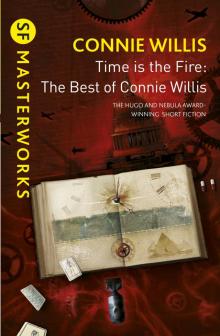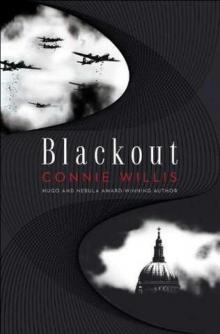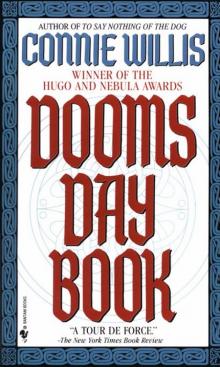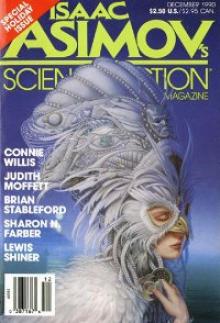- Home
- Connie Willis
Blackout Page 25
Blackout Read online
Page 25
The rector stepped back from the opened door to let them through, but no one moved, not even Nelson, who’d been cooped up since before midnight.
“‘Hie you, make haste!’” Sir Godfrey’s clarion voice rang out. “‘See this dispatch’d with all the haste thou canst,’” and Nelson shot through the door.
Everyone laughed.
“Nelson, come back!” Mr. Simms shouted, and ran after him. He called down from the top of the steps, “No damage I can see,” and the rest of them trooped up the steps and looked around at the street, peaceful in the dim gray predawn light. The buildings were all intact, though there was a smoky pall in the air, and a sharp smell of cordite and burning wood.
“Lambeth got it last night,” Mr. Dorming said, pointing at plumes of black smoke off to the southeast.
“And Piccadilly Circus, looks like,” Mr. Simms said, coming back with Nelson and pointing at what was actually Oxford Street and the smoke from John Lewis. Mr. Dorming was wrong, too. Shoreditch and Whitechapel had taken the brunt of the first round of raids, not Lambeth, but from the look of the smoke, nowhere in the East End was safe.
“I don’t understand,” Lila said, looking around at the tranquil scene. “It sounded like it was bang on top of us.”
“What will it sound like if it is on top of us, I wonder?” Viv asked.
“I’ve heard one hears a very loud, very high-pitched scream,” Mr. Simms began, but Mr. Dorming was shaking his head.
“You won’t hear it,” he said. “You’ll never know what hit you,” and stomped off.
“Cheerful,” Viv said, looking after him.
Lila was still looking toward the smoke of Oxford Street. “I suppose the Underground won’t be running,” she said glumly, “and it’ll take us ages to get to work.”
“And when we get there,” Viv said, “the windows will have been blown out again. We’ll have to spend all day sweeping up.”
“‘What’s this, varlets?’” Sir Godfrey roared. “‘Do I hear talk of terror and defeat? Stiffen the sinews! Summon up the blood!’”
Lila and Viv giggled.
Sir Godfrey drew his umbrella like a sword. “‘Once more into the breach, dear friends, once more!’” he shouted, raising it high. “‘We fight for England!’”
“Oh, I do love Richard the Third!” Miss Laburnum said.
Sir Godfrey gripped the umbrella handle violently, and for a moment Polly thought he was going to run Miss Laburnum through, but instead he hooked it over his arm. “‘And if we no more meet till we meet in heaven,’” he declaimed, “‘then joyfully, my noble lords and my kind kinsmen, warriors all, adieu!’” and strode off, umbrella in hand, as if going into battle.
Which he is, Polly thought, watching him. Which they all are.
“How marvelous!” Miss Laburnum said. “Do you think if we asked him, he’d do another play tomorrow? The Tempest, perhaps, or Henry the Fifth?”
Open for business. And we do mean open.
—SIGN IN BLOWN-OUT WINDOW OF A LONDON DEPARTMENT STORE
London—18 September 1940
IT TOOK POLLY TWO HOURS TO GET TO OXFORD STREET. Since Oxford Circus and Bond Street stations would both be closed from the attack on Oxford Street, she’d intended to take the tube to Piccadilly Circus, but the Circle Line trains weren’t running at all, and when she attempted to take the District and then the Piccadilly, she couldn’t get beyond Gloucester Road and had to leave the station and find a bus. But it only went as far as Bond Street, where a huge pile of rubble blocked the street. She had to walk the rest of the way, dodging barricades and a roped-off area with a notice saying Danger: Gas Leak.
Oxford Street was awash in water from the firemen’s hoses and shattered glass. It took her another quarter of an hour to reach the gutted John Lewis, and when she did, it was much, much worse than she’d envisioned from the photos. The great brick arches gaped emptily onto a vast, blackened expanse of charred beams and girders, dripping with water. It looked less like a burned building than the wreck of some massive ocean liner. Here and there among the drowned wreckage were a half-burnt placard saying On Sale, a sodden glove, a charred clothes hanger.
At the rear of the store Polly could see a fireman playing a hose on the timbers, though the fire was long since out. Two other firemen wound a heavy hose onto a wooden reel, and a fourth walked toward the fire pumper still standing in the middle of the street. A middle-aged woman in trousers and a tin hat was stringing a rope around the area. There was broken glass everywhere, and brick dust, and when Polly looked up Oxford Street, it was shrouded in thick smoke.
She picked her way through the broken glass, stepping over hoses and between puddles. This is pointless, she thought. There’s no way any of the stores will be open, let alone hiring. But two workmen were putting up a banner over Peter Robinson’s main doors that read We’re Open. Don’t Mind Our Mess, as if they were under construction. And she could see a woman going into Townsend Brothers. Polly crunched through the glass behind her, stopping at the door to straighten her jacket and pick glass fragments out of the soles of her shoes before she went in.
She needn’t have bothered. Two shopgirls were sweeping up more glass inside, and a third was showing lipsticks to the woman Polly had followed in. There was no one else on the floor, and no one in the lift except for the lift operator, who asked her, “Didja see what Jerry did to John Lewis?” as she slid the gate across.
There was no one shopping on the fifth floor either. They obviously don’t need any additional help, Polly thought, but the moment she walked into the personnel manager’s office, he offered her the position of junior shop assistant in the lingerie department and escorted her personally down to the third floor to a pretty, brown-haired young woman. “Where is Miss Snelgrove?” the manager asked her.
“She telephoned she’d be late, Mr. Witherill,” she said, smiling at Polly. “She said there was a UXB in the Edgware Road, and they’d cordoned the entire neighborhood off, so she had to go through the park, and—”
“This is Miss Sebastian,” Mr. Witherill cut in. “She will be working the gloves and stockings counter.” And to Polly, “Miss Hayes will show you where things are and explain your duties. Tell Miss Snelgrove to report to me the moment she comes in.”
“Don’t mind him,” Miss Hayes said after he’d left. “He’s a bit nervy. We’ve had three girls give notice this morning, and he’s worried Miss Snelgrove might have legged it as well. She hasn’t, more’s the pity. She’s our floor supervisor and very particular,” she confided, lowering her voice. “I think she’s the reason Betty quit, though she said it was because of what happened to John Lewis. Miss Snelgrove was always on at her about something. Have you worked in a department store before, Miss Sebastian?”
“Yes, Miss Hayes.”
“Oh, good, then you’ll have had some experience with stock and things,” she said, stepping behind the counter. “And you needn’t call me Miss Hayes when it’s only us. Call me Marjorie. And you’re…?”
“Polly.”
“Where did you work, Polly?”
“In Manchester, at Debenham’s.” She’d picked Manchester because of its distance from London and because she knew there was a Debenham’s there. She’d seen a photo of it gutted in a raid in December. But it would be just her luck to have Marjorie say, “Really? I’m from Manchester.”
She didn’t. She said, “Do you know how to write up sales?”
Polly did. She also knew how to do sums, use carbon paper, work an adding machine, sharpen pencils, and every other possible task Research and Mr. Dunworthy—who believed historians should be prepared for every possible contingency—thought a shopgirl might conceivably need to know.
The money had been the most difficult to learn. Really, their monetary system had been insane, and she’d expected that to give her the most trouble at work, but Marjorie told her all of Townsend Brothers’ cash transactions were handled by the financial office upstairs. All Polly had to do
was place the money and the bill in a brass tube, send it shooting along a system of pneumatic chutes, and it came back moments later with the correct change. I needn’t have learned all those guineas and half-crowns and farthings, she thought.
Marjorie showed her how to bill a sale to a customer’s account and write up a delivery order, which drawers the different sizes of gloves and silk and cotton lisle and woolen stockings were in, and how to line the hosiery boxes with a single sheet of tissue, lay the stockings in them, then wrap the box in brown paper, folding the ends under and tying them with string from a large bolt.
That was something neither Research nor Mr. Dunworthy had thought of, but it didn’t look too difficult. But when she made her first sale—Marjorie had been right, it had picked up; by eleven, there were half a dozen women shoppers, one of whom, an elderly lady, told Polly, “When I saw what Hitler’d done to Oxford Street, I decided to buy a new pair of garters, just to show him!”—she made a complete botch of the wrapping. Her ends were uneven, her folds crooked, and when she tried to wrap the string around it, the wrapping came completely undone.
“I’m so sorry, madam. It’s my first day,” she said, trying again, and this time she managed to hold the parcel together, but her knot was so loose the string slid off one end.
Marjorie came to her rescue, discarding the tangled string and starting with a new length, which she deftly tied around the parcel, and after the customer had departed, she said kindly, “I’ll take over the wrapping till you’ve got the hang of it.” But it was clearly something she should already know how to do, so in between customers Polly practiced on an empty box, without much success.
At noon the “very particular” Miss Snelgrove arrived. Polly hastily jammed the string she’d been practicing with into her pocket and tucked in her blouse.
Marjorie hadn’t been exaggerating about her. “I expect the highest standards from those under me, a polite manner, and neatness of both work and appearance,” she told Polly, looking coldly at her navy blue skirt. “Regulation wear for our shop assistants is a white blouse, a plain black skirt—”
I told Wardrobe that, Polly thought disgustedly.
“—and black, low-heeled shoes. Have you a black skirt, Miss Sebastian?”
“Yes, ma’am,” she said. Or I will as soon as I check in with Mr. Dunworthy tonight to tell him I have a position.
“How long have you been in London?”
“I arrived last week.”
“You’ve experienced air raids then?”
“Yes, ma’am.”
“I cannot afford to have girls working under me who are nervy or easily frightened,” she said sternly. “Townsend Brothers’ employees must project an air of calm and courage at all times.”
Wanted: shop assistant, Polly thought. Neat, polite, cool under fire.
“Show me your sales book,” Miss Snelgrove commanded, and proceeded to show Polly everything Marjorie had already shown her, including how to wrap a parcel. She was even more expert at it than Marjorie, and more exacting. “You must not waste string,” she said, tying the parcel tightly. “Now you do it.”
Marjorie, over at the lingerie counter, looked at Polly in horror. Wardrobe won’t need to find me a black skirt, Polly thought. After I show her, I won’t have a job, and the air-raid siren went.
Polly had never been so glad to hear anything in her life, even though Townsend Brothers’ shelter turned out to be an airless basement room with pipes running along the walls and nowhere to sit. “Chairs and cots are reserved for customers,” Marjorie told her, and Miss Snelgrove said sternly, “No leaning. Stand up straight.”
Polly hoped the raid would be a long one, but it was only half an hour before the all clear went. By then, though, it was Polly’s luncheon break, and then Miss Snelgrove’s, and shortly after that Mr. Witherill brought down “Miss Doreen Timmons, who will take over Scarves and Handkerchiefs,” and Miss Snelgrove had to show her the procedures. And all of Polly’s customers wanted their purchases delivered, so she was saved from any further wrapping. But obviously she couldn’t count on new employees or air raids tomorrow. She’d have to perfect her wrapping skills in Oxford.
That’s one advantage of time travel, she thought, starting home from work. If it takes a week to master it, I can do it and still be on time to work tomorrow.
She debated going straight to the drop, but she couldn’t risk being seen going into the alley and followed. She’d have to wait till after the sirens had gone, the ARP wardens had made their rounds, and the contemps were in their basements or the shelters. The raids tonight began at 8:45, which meant the sirens wouldn’t sound till a quarter past, and she couldn’t go to the drop till after supper.
Which was a pity. The moment she opened the front door at Mrs. Rickett’s her nostrils were assailed by an unpleasant odor. “It’s kidney stew tonight,” Miss Laburnum said and dropped her voice. “I never thought I’d be eager to hear the sound of approaching bombers.” She leaned past Polly to look out the door at the sky. “Do you think there’s a chance they’ll be early tonight?”
Unfortunately, no, Polly thought, but as she started up the stairs to take off her coat and hat, the sirens went. “Oh, good,” Miss Laburnum said. “Let me get my things and we’ll walk over together. I’ll tell you all about Sir Godfrey on the way.”
“No… I…” Polly stammered, bewildered that the sirens had gone so early. “I… There are some things I must do before I go. I need to wash out my stockings and—”
“Oh, no, I won’t hear of it,” Miss Laburnum said. “It’s far too dangerous. I read in the Standard about a woman who stayed behind to put out the cat and was killed.”
“But I’ll only be a few minutes. I’ll come as soon as—”
“Even a single minute can make all the difference, isn’t that right?” Miss Laburnum said to Miss Hibbard as she hurried down the stairs, stuffing her knitting into her bag.
“Oh, my, yes.”
“But Mr. Dorming isn’t here,” Polly said. “You two go on ahead, and I’ll fetch him—”
“He’s already gone,” Miss Hibbard said. “He left the moment he heard what supper was. Come along,” and there was nothing for it but to go with them. She would have to wait till they reached St. George’s and then say she’d forgot something and needed to go back. If the raids hadn’t begun by then.
How could she have got the time wrong? she wondered, half listening to Miss Laburnum prattle on about how wonderful Sir Godfrey was, “Though actually I prefer Barrie’s plays to Shakespeare’s, so much more refined.” The raids had begun at 8:45 on the eighteenth. But Hyde Park’s siren was going, too, and as they crossed the street, Kensington Gardens’ started up. Colin must have mixed the dates.
They were nearly to the church. “Oh, dear,” Polly said. “I forgot my cardigan. I must go back.”
“I have a shawl you can borrow,” Miss Hibbard said, and before Polly could think of a response, Lila and Viv had come running up to tell her about John Lewis having been hit.
“Thank goodness I only found out about that job yesterday,” Lila said breathlessly. “I’d never have forgiven myself if you’d got it and been working there when it was hit.”
“Oh, dear,” Miss Hibbard said, “I believe I hear planes,” and hustled them all down the steps and into the shelter.
Polly debated making a break for it, but she would never make it. Mrs. Brightford, the little girls, Mr. Simms, and his dog were all coming down the stairs, followed by the rector, who did a quick head count and bolted the door.
And now what was she supposed to do about a black skirt? And learning to wrap? She might be able to tell Miss Snelgrove she’d been caught by the sirens and hadn’t been able to go home—which is true, she thought wryly—but what excuse could she give for producing such mangled packages? I’ll simply have to practice here, she thought, checking her pocket to make certain she still had the length of string. She did. When Sir Godfrey offered her his Times (with no t
race of the magnificence of the night before—he’d reverted completely to his role of elderly gentleman) she took it, and after everyone had gone to sleep—the bombing hadn’t started till 8:47 after all, in spite of the sirens—she tiptoed over to the bookcase for a hymnal and attempted to wrap it in a sheet of the newspaper.
It was much easier to fold than the store’s heavy brown paper, and she didn’t have the pressure of a customer—or Miss Snelgrove—watching her, but she still made a botch of it. She tried again, holding the folded end against her middle to keep it from lapping open as she wrapped the string. That worked better, but the newsprint left a long black streak on her blouse.
“I expect neatness in your appearance,” Miss Snelgrove had said, which meant she’d have to wash out her blouse and iron it dry after the all clear. The raids were supposed to be over by four, but as she’d learned tonight, that didn’t mean the all clear would sound then.
She took a new sheet of the Times and tried again. And again, cursing the uncooperative string and wondering why Townsend Brothers couldn’t use cellophane tape instead. She knew it had been invented. She’d used it when—
A bomb exploded nearby with a sudden cellar-shaking crash, and Nelson leaped up, barking wildly. Polly jumped, and the newsprint tore across.
“What was that?” Miss Laburnum demanded sleepily.
“Stray five-hundred-pounder,” Mr. Simms said, stroking his dog’s head.
Mr. Dorming listened and then nodded. “They’re on their way home,” he said and lay back down, but after a few minutes of silence, the raids abruptly started up again, the anti-aircraft guns beginning to pound, the planes roaring overhead.
Mr. Dorming sat up again, and then the rector and Lila, who said disgustedly, “Oh, not again!” The others, one by one, were waking up and staring nervously at the ceiling. Polly kept wrapping, determined to nail the skill down before morning. There was a clatter, like hail hitting the street above them.
“Incendiaries,” Mr. Simms said.

 Passage
Passage Bellwether
Bellwether Blackout
Blackout Doomsday Book
Doomsday Book A Lot Like Christmas: Stories
A Lot Like Christmas: Stories Water Witch
Water Witch To Say Nothing of the Dog
To Say Nothing of the Dog Fire Watch
Fire Watch The Winds of Marble Arch and Other Stories
The Winds of Marble Arch and Other Stories Uncharted Territory
Uncharted Territory All Clear
All Clear Crosstalk
Crosstalk Lincoln's Dreams
Lincoln's Dreams Miracle and Other Christmas Stories
Miracle and Other Christmas Stories Time is the Fire
Time is the Fire Blackout ac-1
Blackout ac-1 Dooms Day Book
Dooms Day Book Jack
Jack The Doomsday Book
The Doomsday Book Terra Incognita
Terra Incognita The Best of Connie Willis
The Best of Connie Willis Cibola
Cibola Schwarzschild Radius
Schwarzschild Radius Even the Queen
Even the Queen The Last of the Winnebagos
The Last of the Winnebagos Spice Pogrom
Spice Pogrom Oxford Time Travel 1 - Blackout
Oxford Time Travel 1 - Blackout At The Rialto
At The Rialto A Lot Like Christmas
A Lot Like Christmas